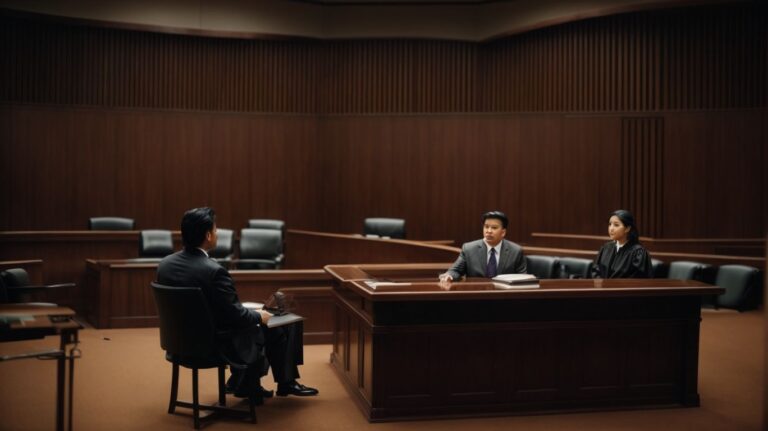Have you ever wondered about the connection between psychology and the legal system? This article explores the fascinating relationship between these two fields and delves into the impact of psychology on legal decision-making.
From biases and emotions to the importance of mental health, we’ll examine the common psychological issues that arise in legal cases. We’ll discuss how psychology can be used in legal settings, ethical considerations, and the future implications of psychology in the legal practice. Join us as we uncover the intersection of psychology and the law.
Contents
- 1 Key Takeaways:
- 2 What Is the Relationship Between Psychology and Legal Practice?
- 3 How Does Psychology Impact Legal Decision Making?
- 4 What Are Some Common Psychological Issues in Legal Cases?
- 5 How Can Psychology Be Used in Legal Settings?
- 6 What Are the Ethical Considerations of Using Psychology in Legal Practice?
- 7 What Are the Future Implications of Psychology in Legal Practice?
- 8 Frequently Asked Questions
- 8.1 What is the role of psychology in legal practice?
- 8.2 How does psychology help attorneys in their work?
- 8.3 Can psychology be used to understand the mindset of a jury?
- 8.4 What are some common psychological factors that can influence a legal case?
- 8.5 How can attorneys use insights from psychology to build a stronger case?
- 8.6 Is it important for attorneys to have a basic understanding of psychology?
Key Takeaways:
What Is the Relationship Between Psychology and Legal Practice?
The relationship between psychology and legal practice encompasses a multifaceted understanding of human behavior within the interdisciplinary perspective of law and psychology.
Psychology provides valuable insights into the complexities of human behavior, emotion, and cognition, which are central to legal proceedings and decision-making. Understanding how individuals perceive, process, and respond to legal situations can inform legal strategies and interventions.
The integration of psychological principles in legal practice can enhance the assessment of witness credibility, mitigate biases, and provide effective techniques for jury selection. Conversely, legal frameworks establish boundaries and regulations that shape psychological assessments, interventions, and understanding of mental health within the context of criminal responsibility and civil liability.
How Does Psychology Impact Legal Decision Making?
Psychology exerts a profound impact on legal decision making, permeating the cognitive processes, emotional influences, and ethical considerations inherent in the legal sphere.
This influence is particularly evident in the way cognitive biases, such as confirmation bias and anchoring, can sway legal judgments.
The emotional factors at play, including stress, empathy, and societal perceptions, can significantly shape the outcomes of legal proceedings.
Ethical considerations rooted in psychology, such as moral decision-making and perception of fairness, offer critical insights into the complexities of legal reasoning.
The Influence of Biases
The impact of biases in legal decision making is a critical aspect that intertwines the realms of psychology and law, revealing the subtle intricacies of cognitive biases and their implications on judgment within the legal context.
Understanding the cognitive biases that influence legal decision making is imperative in comprehending the intricacies of human judgment in legal proceedings. Biases, whether explicit or implicit, can lead to flawed decision-making processes, potentially affecting the outcome of legal cases.
These biases are deeply rooted in the psychological makeup of individuals, playing a significant role in shaping perceptions and influencing interpretations of evidence and testimony. The influences of biases are multifaceted, affecting not only judges and jurors but also legal practitioners, shaping every stage of the legal process.
Such biases can impact the evaluation of evidence, witness credibility, and even the formulation of judicial rulings, manifesting in various forms such as confirmation bias, halo effect, and anchoring bias. These psychological predispositions can subtly sway legal decisions, underscoring the intricate relationship between psychological factors and the administration of justice.
The Role of Emotions
Emotions play a pivotal role in legal decision making, intertwining the realms of psychology and law through their impact on empathy, communication, and the subjective interpretation of legal matters.
When empathy is heightened, legal professionals are better equipped to understand the nuances of a case, tapping into the emotions experienced by all involved parties.
This heightened emotional communication can influence the way evidence is presented and interpreted, shaping the decisions made in the legal process.
The subjective interpretation of laws and regulations can be influenced by the emotional state of legal professionals, potentially impacting the outcome of a case.
The Importance of Mental Health
The importance of mental health in legal decision making underscores the pivotal role of forensic psychologists and emotional intelligence in navigating the psychological complexities inherent in legal practice.
Forensic psychologists play a crucial role in the legal system by conducting assessments and evaluations to aid in legal decision-making processes. They apply their expertise in understanding human behavior, cognition, and emotion to provide valuable insights into the mental state of individuals involved in legal proceedings.
Emotional intelligence, which encompasses self-awareness, self-regulation, empathy, and interpersonal skills, is integral in legal settings. Professionals with high emotional intelligence can effectively manage their own emotions and understand and influence the emotions of others, contributing to improved communication and conflict resolution in legal contexts.
The intersection of mental health and legal proceedings requires a nuanced approach that considers the psychological well-being of individuals involved in legal matters. By recognizing the intricate interplay between mental health and legal decision making, professionals can strive for fair and just outcomes that prioritize the holistic well-being of all parties involved.
What Are Some Common Psychological Issues in Legal Cases?
Common psychological issues in legal cases encompass complex phenomena such as trauma-induced memory challenges, assessments of competency to stand trial, and the nuanced considerations surrounding the insanity defense.
When encountering cases involving trauma-induced memory challenges, legal professionals must grapple with the complexities of memory distortion, flashbacks, and dissociation that may impact witness testimony and victim recollection.
Competency assessments play a crucial role in determining a defendant’s ability to understand court proceedings and participate in their defense. This involves evaluations of cognitive functioning and mental capacity.
Insights into the insanity defense delve into the intricate interplay of mental illness, criminal responsibility, and the ability to distinguish right from wrong at the time of the offense. These nuanced considerations prompt a comprehensive examination of the defendant’s mental state, often requiring input from mental health experts to provide a well-rounded perspective for the legal proceedings.
Trauma and Memory
The intersection of trauma and memory in legal cases yields behavioral effects that are central to understanding the psychological dimensions of traumatic experiences within the legal context.
These complexities often manifest in the form of disorganized memory recall, heightened emotional responses, and altered perceptions of events, making it challenging for individuals to convey their experiences accurately within legal proceedings.
The impact of trauma on memory can lead to inconsistencies and gaps in recollection, which can significantly influence the credibility and reliability of witness testimonies and victim statements.
Such phenomena underscore the intricate interplay between psychological trauma and the legal system, posing unique challenges for courts and legal professionals in cases involving traumatic events.
Competency to Stand Trial
Assessments of competency to stand trial are pivotal in addressing the psychological complexities that underpin legal cases, highlighting the critical role of forensic psychologists in navigating these nuanced considerations.
When individuals are facing legal proceedings, it’s crucial to ensure that they possess the ability to understand the charges against them and can assist in their own defense.
Forensic psychologists play a crucial role in evaluating these aspects, considering factors such as cognitive functioning, mental health, and their capacity to engage with legal counsel.
The assessments conducted by forensic psychologists involve a comprehensive examination of the individual’s cognitive abilities, decision-making processes, and understanding of the legal process, all in the context of the specific legal standards and guidelines.
These assessments are not only essential for the legal process but also hold ethical significance, safeguarding the rights and well-being of the individuals under assessment.
Insanity Defense
The insanity defense presents a multifaceted interplay between psychological issues and legal cases, necessitating comprehensive forensic evaluations and critical judgment with regards to the psychological components underpinning the defense.
Forensic evaluations play a pivotal role in assessing the mental state of the defendant at the time of the alleged crime.
These evaluations involve a thorough examination of the individual’s psychological history, behavior patterns, and mental health records. Moreover, critical judgment is essential in determining the presence of a severe mental illness that impaired the defendant’s capacity to understand the nature of their actions or distinguish right from wrong.
How Can Psychology Be Used in Legal Settings?
The application of psychology in legal settings encompasses multifaceted strategies such as jury selection, witness preparation, and the formulation of sentencing recommendations, highlighting the pivotal role of psychological insights in legal proceedings.
The integration of psychological principles into legal processes contributes significantly to understanding human behavior in the context of legal matters. In jury selection, for instance, psychological assessments can inform the decision-making process by identifying potential biases or predispositions among the jurors.
Witness preparation involves leveraging psychological techniques to assist witnesses in managing stress, improving memory recall, and enhancing their communication skills, ultimately enhancing the quality of their testimony. In the formulation of sentencing recommendations, psychologists provide valuable insights into factors such as mental health, risk assessment, and rehabilitative potential, thereby informing fair and just sentencing decisions.
Jury Selection
Jury selection in legal settings involves a nuanced application of psychology, where trial consultants navigate cognitive biases and psychological insights to form effective jury compositions for legal proceedings.
Understanding the intricate process of jury selection requires a deep dive into the complexities of human behavior and decision-making. Trial consultants meticulously analyze potential jurors, grasping the subtle nuances of cognitive biases that could impact their perceptions.
The psychological considerations involved in forming jury compositions cannot be underestimated. These considerations encompass the individual and collective mental schemas, attitudes, and emotions that shape jurors’ perspectives and judgments.
Considering these factors, the role of trial consultants extends beyond legal expertise, diving into the interplay of psychology and law in an intricate dance to compose an impartial and open-minded jury.
Witness Preparation
Effective witness preparation in legal settings hinges on the adept application of psychological principles, encompassing strategic communication and persuasive techniques to optimize witness testimony within legal proceedings.
The psychological principles play a crucial role in witness preparation. They delve into understanding the cognitive processes and emotional responses of witnesses, shaping the communication and persuasiveness of their testimony.
The unique application of strategic communication techniques tailors the messaging to resonate with the judge and jury. This allows for a more effective delivery of the witness’s testimony.
The interplay of persuasive techniques emphasizes the presentation of factual information in a compelling manner. By leveraging these components, legal teams can enhance the overall effectiveness of witness testimony in a courtroom setting.
Sentencing Recommendations
The formulation of sentencing recommendations in legal settings necessitates a comprehensive integration of psychological insights, ethical considerations, and assessments of subjective well-being to ensure just and effective legal outcomes.
Psychological insights play a crucial role in understanding the underlying motivations and mental state of the offender. This includes consideration of factors such as cognitive abilities, emotional stability, and behavioral patterns, all of which may have influenced the criminal behavior.
Ethical considerations involve addressing fairness, justice, and morality in the context of the offense and the offender’s circumstances. It requires a careful examination of the potential consequences of the recommended sentencing on the individual and broader societal implications.
Assessments of subjective well-being enable the consideration of the offender’s overall mental and emotional health, which can have a significant impact on their rehabilitation and reintegration into society. Such assessments can provide valuable insights into the potential for reform and future risk of reoffending.
What Are the Ethical Considerations of Using Psychology in Legal Practice?
The ethical considerations surrounding the utilization of psychology in legal practice encompass fundamental principles such as autonomy, competence, and confidentiality, necessitating a delicate balance between professional responsibilities and psychological insights within legal proceedings.
When incorporating psychological principles into legal proceedings, it is crucial to uphold the autonomy of individuals involved. This ensures that their decisions and actions are based on informed consent and free will. Furthermore, competence must be carefully evaluated to ascertain the mental capacity of individuals to participate effectively in legal processes. This is essential for maintaining fairness and equity.
Another important factor to consider is confidentiality. Sensitive psychological information must be safeguarded to preserve trust and privacy, in line with professional ethical codes. This is crucial for maintaining the integrity of the legal system and upholding the rights of individuals involved.
What Are the Future Implications of Psychology in Legal Practice?
The future implications of psychology in legal practice encompass transformative elements such as advanced relationship building, heightened critical thinking, and the integration of emotional intelligence to foster progressive and effective legal representation.
Psychology’s integration into legal practice offers a profound shift towards a more empathetic and nuanced approach. Through advanced relationship building, legal professionals can better understand their clients’ perspectives, enhance communication, and build trust.
Heightened critical thinking, influenced by psychological principles, give the power tos lawyers to navigate intricate human emotions and motivations when analyzing cases, leading to more comprehensive and balanced legal strategies.
Integrating emotional intelligence also raises ethical standards, promoting a deeper understanding of clients’ well-being, and enhancing the quality of legal services provided.
Frequently Asked Questions
What is the role of psychology in legal practice?
Psychology plays a crucial role in legal practice by providing insights into human behavior, motivations, and decision-making processes that can influence legal proceedings and outcomes.
How does psychology help attorneys in their work?
By understanding psychological principles and theories, attorneys can better analyze and present evidence, assess the credibility of witnesses, and develop effective strategies for their clients.
Can psychology be used to understand the mindset of a jury?
Yes, psychology can be used to understand the mindset of a jury by examining factors such as group dynamics, biases, and decision-making processes that can impact their judgment.
What are some common psychological factors that can influence a legal case?
Some common psychological factors that can influence a legal case include memory, perception, emotions, and biases, which can affect witness testimony, jury deliberations, and overall case outcomes.
How can attorneys use insights from psychology to build a stronger case?
Attorneys can use insights from psychology to build a stronger case by applying principles such as social influence, persuasion, and communication to present evidence and arguments in a more compelling manner.
Is it important for attorneys to have a basic understanding of psychology?
Yes, it is important for attorneys to have a basic understanding of psychology as it can help them better navigate the complexities of human behavior and improve their legal practice.





